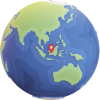Case studies are organised by region, with each region featuring links to the countries where the case studies are located.
Guyana

According to AML Intelligence, U.S. government officials have issued several warnings to Exxon Mobil, urging them to avoid business dealings with Nazar Mohamed and his son, Azruddin, two prominent figures in the Guyanese mining industry. The Mohameds are suspected of money laundering, drug trafficking, and gold smuggling. Indeed, the Mohameds are under investigation by the DEA, FBI, and Homeland Security for allegedly smuggling Colombian cocaine and Venezuelan gold, and laundering money for drug traffickers, including sanctioned Russian nationals. Reports indicate that such illegal gold trafficking funds armed conflicts and supports criminal networks. Despite these allegations, the Mohameds assert that their trade relations with American companies are legitimate. U.S. authorities have warned Exxon of such suspicions, yet AML Intelligence reports that Exxon Mobil has proceeded with a $300 million deal to build an onshore logistics base with the Mohameds in April 2022. In response, the U.S. authorities are considering sanctions against the Mohameds, which could force Exxon to sever ties with them.
Keywords: Latin America, Guyana, mining, gold, money laundering, drug trafficking, gold trafficking, smuggling, serious organised crime, terrorist and coflict financing, sanctions evasion
Sources: https://www.amlintelligence.com/2023/07/special-report-exxon-mobil-repeatedly-warned-not-to-do-business-with-mining-magnates-suspected-of-money-laundering/

In the context of Exxon Mobil’s oil extraction operations in Guyana, the article uncovers significant challenges related to organised crime and drug trafficking. The influx of foreign workers and the rapid development brought about by the oil boom have attracted criminal networks seeking to exploit the newfound wealth. These networks are involved in drug trafficking, money laundering, and other illicit activities, complicating efforts to maintain law and order. The article highlights that the oil boom has strained local infrastructure and governance, making it difficult to address the growing influence of organised crime effectively. Corruption and weak enforcement of laws further exacerbate the problem, allowing criminal organisations to flourish. The situation demands robust international cooperation, stricter regulatory frameworks, and enhanced local policing to combat the pervasive influence of organized crime and mitigate the risks associated with drug trafficking in this rapidly evolving economic landscape.
Keywords: Latin America, Guyana, minerals, serious organised crime, drug trafficking, money laundering, rule of law, corruption and bribery
Source: https://www.reuters.com/investigates/special-report/exxon-mobil-guyana/
Honduras

Cattle can both themselves be laundered (if they are grazed on land that has been illegally cleared and converted to pasture) and used as a means of laundering criminal proceeds from other exploits, like drugs trafficking. In Brazil, cattle have been laundered to obscure their links to land clearing, when they are moved from ranches that have contributed to land conversion through “clean” ranches that have not resulted in recent forest loss.
In 2009, several Brazilian slaughterhouses signed the Terms of Adjustment of Conduct, an initiative of the Federal Prosecution Office and the Public Commitment on Cattle Ranching, and a voluntary protocol developed by Greenpeace, which precludes them from purchasing cattle reared on deforested land. However, a single cow might pass through up to 10 farms before it is slaughtered (from birth, through rearing and fattening). Any of these farms might be linked to illegal deforestation but many slaughterhouses assess links to deforestation only on the last farm a cow passes through - their direct supplier. As long as the last farm in the supply chain is from a “clean” ranch that is free from recent deforestation then slaughterhouses (and subsequent transporters and retailers, like supermarkets) are likely to mark them as deforestation-free, even if they have spent the majority of their life on and have passed through nine other ranches that have been converted from forested land. Indeed, data indicates that some ranchers own both “dirty” and “clean” ranches and launder cattle through their own properties. So long as one property is kept clean, they can continue to clear land for cattle grazing purposes on any number of other ranches.
Other investigations by Global Witness have found that ranchers have fraudulently edited the boundaries of their ranch once they have cleared areas of land, so that this land conversion is no longer included within the property’s scope and the ranch appears free from deforestation. This is alleged to be the case for the Fazenda Espora de Ouro II Ranch in Brazil’s Pará state, which Global Witness also found appears to be registered in the name of an individual who could not legally be its owner (based on assessment of a database of land titles and beneficiaries).
Cattle can also – and concurrently – be used as a means of laundering the proceeds of illicit activity. Drug traffickers – especially in Colombia (where the traceability of beef produce is particularly poor), Honduras, and Guatemala – are known to launder revenue from drugs by buying or grabbing land which they convert into pasture for cattle, which they also purchase with narcotrafficking proceeds. When the cattle are sold, profits are hard to trace back to the drug network and their illicit proceeds are effectively laundered. This practice, known as “narco-ranching”, is suspected of contributing up to 87% of deforestation in the Maya Biosphere Reserve, a large UNESCO heritage area of forest which covers over 2 million hectares of rainforest across northern Guatemala and borders other protected forests in Mexico and Belize. The Reserve is highly vulnerable to deforestation by crime groups due to its strategic location along a significant drug trafficking route up through Guatemala and Mexico leading to the US.
Cattle ranching in such areas also frequently serves to hide airstrips and production facilities used by traffickers to produce and transport drugs or other illicit products. Airstrips now pepper the Maya Biosphere reserve, which are used by planes coming in from Colombia and Venezuela with cocaine to be smuggled across the border into Mexico.
Keywords: Latin America, Honduras, primary production, money laundering, illegal deforestation, human trafficking, serious organised crime
Source: https://www.vox.com/science-and-health/2022/10/19/23403330/amazon-rainforest-deforestation-cattle-laundering

Organised crime groups engaging in drug trafficking and the illicit palm oil trade often exploit environmental reserves in Honduras. There is a rapid spread of oil palm plantations in the country, as palm oil is increasingly a high earning and low production export. Palm oil accounts for about 40% of global demand for vegetable oil as both food and fuel, with annual production having more than quadrupled since 1995. Palm oil, however, presents a serious threat to the biodiversity of the wetlands and the water quality of communities, among other environmental and health threats.
Making matters worse, illegal palm oil crops are increasingly being harvested by drug traffickers and other criminals in Honduras, with illegal plantations occurring across national parks and other environmental reserves. Investment in palm oil can provide criminals with a seemingly legitimate reason to use and control land in certain areas, as well as seemingly legitimate income that can be used to launder criminal proceeds.
Keywords: Latin America, Honduras, palm oil, primary production, serious organised crime, drug trafficking, illegal deforestation, money laundering
Source: https://www.theguardian.com/global-development/2023/nov/27/deadly-harvest-how-global-demand-for-palm-oil-is-fuelling-corruption-in-honduras

In Honduras' Río Plátano Biosphere Reserve, organised crime and drug trafficking are significantly contributing to environmental degradation and social instability. The UNESCO site, vital for its biodiversity, faces rampant illegal cattle ranching and land clearing by narcotraffickers seeking to launder money through cattle farming. These criminal groups exploit the absence of effective law enforcement and weak governance, using the remote area to grow their drug operations and clear land for illegal ranching, which destroys forest habitats. Corruption further exacerbates the problem, with local authorities often complicit or powerless against these powerful criminal networks. The unchecked expansion of drug trafficking and organised crime into the reserve not only threatens the environment but also destabilises local communities.
Keywords: Latin America, Honduras, cattle, primary production, serious organised crime, drug trafficking, rule of law, illegal production
Source: https://news.mongabay.com/2018/12/there-are-no-laws-cattle-drugs-corruption-destroying-honduras-unesco-site/

Illegal timber and drug trafficking are closely intertwined in northeastern Honduras, particularly in the town of Dulce Nombre de Culmí. The nearby forests of pine, mahogany, and cedar feed a timber trade worth around $60-80 million between 2016 and 2018. However, environmental agencies warn that 50-60% of this trade comes from illegal logging, much of it from the country’s northeastern natural reserves where drug trafficking is also prevalent.
Culmí is the last settlement before entering the Río Plátano Biosphere, a protected forest where drug trafficking and illegal logging have crossed paths for over a decade. The mountains and plains surrounding Culmí are dotted with clandestine airstrips, many built during the drug boom a decade ago. These airstrips, carved from the dense forests in the area, were then used to sell wood to timber traffickers and drug trafficking groups.
In Olancho, Yoro, and Gracias a Dios—three departments renowned for their timber production—drug trafficking groups are known to engage in timber trafficking. Groups of farmers, often migrants from the poorest areas of southern Honduras, settle in unpopulated lands in and around the Río Plátano Biosphere. There, they harvest wood illegally, often with protection from corrupt officials and politicians, as well as support from drug trafficking groups.
The wood is usually cut without securing official permission from Honduras’ Institute of Forest Conservation. It is then combined with legal shipments, mostly at the sawmills, either by falsifying logging permits or bribing police responsible for monitoring timber transport. Meanwhile, illegally harvested precious woods, such as mahogany and cedar, usually head north along clandestine routes to the department of Gracias a Dios, and from there to processing hubs such as La Ceiba. These are the same routes that drug shipments travel along.
Keywords: Latin America, Honduras, timber, primary production, drug trafficking, illegal logging, illegal timber trade, fraudulent documentation, corruption and bribery
Source: https://news.mongabay.com/2021/04/drugs-and-agriculture-cause-deforestation-to-skyrocket-at-honduran-unesco-site/
Mexico

According to InSight Crime, drug cartels in Mexico have expanded their activities into illegal logging, particularly in the forested areas of Chihuahua. This area is a significant part of the drug trafficking corridor known as the Golden Triangle. This growing overlap between illegal logging and drug trafficking is severely affecting Indigenous communities, especially the Tarahumara. The report cites a case where individuals were forced off their land by armed groups, highlighting the dangers faced by those opposing illegal logging. The cartel has become actively involved in illegal logging to clear land for poppy cultivation, pushing inhabitants off their ancestral lands. The situation in Chihuahua is exacerbated by widespread violence and corruption, with drug cartels, competing over the control over both drug and illegal timber routes. This violence has led to high homicide rates, with criminal groups targeting anyone opposing their activities. In addition, the article details the methods used by cartels to control the illegal timber trade, including extortion and violent takeovers of sawmills. In the town of San Juanito, a hub for wood trafficking, drug cartels have infiltrated the industry, forcing sawmills to process illegally sourced wood and laundering it into the legal supply chain.
Keywords: Latin America, Mexico, timber, primary production, illegal logging, drug trafficking, corruption and bribery, murder, extortion, Indigenous rights violations
Sources: https://insightcrime.org/investigations/drug-cartels-illegal-logging-mexico/

A report by Global Initiative details the shift in crime from drug cultivation to illegal logging in the Sierra Tarahumara region of Chihuahua, Mexico, due to decreased demand for opium gum. Drug Trafficking Organisations (DTOs) began heavily involving themselves in illegal logging around 2014-2015. DTOs can earn between MXN 50,000–70,000 per night from illegal logging, exploiting workers under threats of violence. Local mafias were also involved in this shift, albeit operating on a smaller scale compared to DTOs and rarely resorting to violence. They control logging operations, sawmills, and transportation, often involving familial clans. DTOs, on the other hand, engage in a range of criminal activities, including drug trafficking, extortion, and extreme acts of violence, including massacres and beheadings. Indigenous communities and environmental activists are heavily impacted by such threats and violence. They face displacement due to violence and land grabs by criminal groups. In addition, illegal logging and the cultivation of illicit crops contribute to significant deforestation. Finally, criminal groups use bribes and threats to secure cooperation from authorities. Local institutions often lack the resources and capacity to effectively combat organised crime.
Keywords: Latin America, Mexico, timber, primary production, illegal logging, drug trafficking, organised crime, corruption and bribery, land grabbing, Indigenous rights violations, murder, extortion, labour rights violations
Sources: https://globalinitiative.net/wp-content/uploads/2020/04/Mexican.Illegal.Logging.22.04.v1.final_.pdf

A report by Global Initiative details the many labour rights violations related to child labour, forced labour and discriminatory practices in Chihuahua, Mexico’s forestry sector. In Chihuahua, organised crime groups, including drug cartels, forcibly recruit individuals, particularly young people, for illegal activities, including illegal logging. These workers endure exploitative conditions that include involuntary work, forced overtime, and hazardous environments. Organised crime groups exert control over them through threats, violence, and drug addiction, fostering a climate of coercion. In addition, child labour is prevalent in Chihuahua’s forestry sector, particularly in rural areas where children often work alongside their parents to supplement family income. Children engaged in forestry work are exposed to dangerous work conditions, including handling heavy loads, exposure to sawdust, and working with machinery. Systemic discrimination against indigenous people and women is widespread in the sector. Indigenous workers are often paid less, subjected to the most dangerous tasks, and excluded from leadership positions. Women, particularly Indigenous women, face significant barriers to employment in logging and sawmill operations.
Keywords: Latin America, Mexico, timber, primary production labour rights violations, drug trafficking, child labour, forced labour, discrimination, illegal logging, Indigenous rights violations
Sources: https://globalinitiative.net/wp-content/uploads/2020/04/Mexican.Illegal.Logging.22.04.v1.final_.pdf
Panama

In Panama, the illegal timber trade, particularly the trade of the valuable cocobolo wood, has caused grave deforestation and exacerbated crime in ports. A report by InSight Crime explains that on March 28 and 31 2022, Panamanian police seized two containers in Colón, carrying around 850 pieces of cocobolo wood, destined for China. Interceptions of illegal cocobolo wood shipments occur frequently along the Panama Canal. In the Darién province along the Colombian border this logging has been extensive, with 20% forest cover loss in seven years. In Panama's ports, some of the busiest in the region due to the Panama Canal, timber trafficking takes place alongside drugs, arms trafficking, and human smuggling. Corruption is also rampant, with the Army, police, Panama Canal, and port staff implicated in facilitating illegal activities. Timber traffickers benefit from connections within the ports, easing the movement of illegal wood shipments.
Keywords: Latin America, Panama, timber, trade and transport, illegal timber trade, drug trafficking, human trafficking, corruption and bribery, illegal deforestation
Sources: https://insightcrime.org/news/panama-struggles-fight-timber-trafficking-in-forests-and-ports/


The Environmental Crimes Financial Toolkit is developed by WWF and Themis, with support from the Climate Solutions Partnership (CSP). The CSP is a philanthropic collaboration between HSBC, WRI and WWF, with a global network of local partners, aiming at scaling up innovative nature-based solutions, and supporting the transition of the energy sector to renewables in Asia, by combining our resources, knowledge, and insight.


